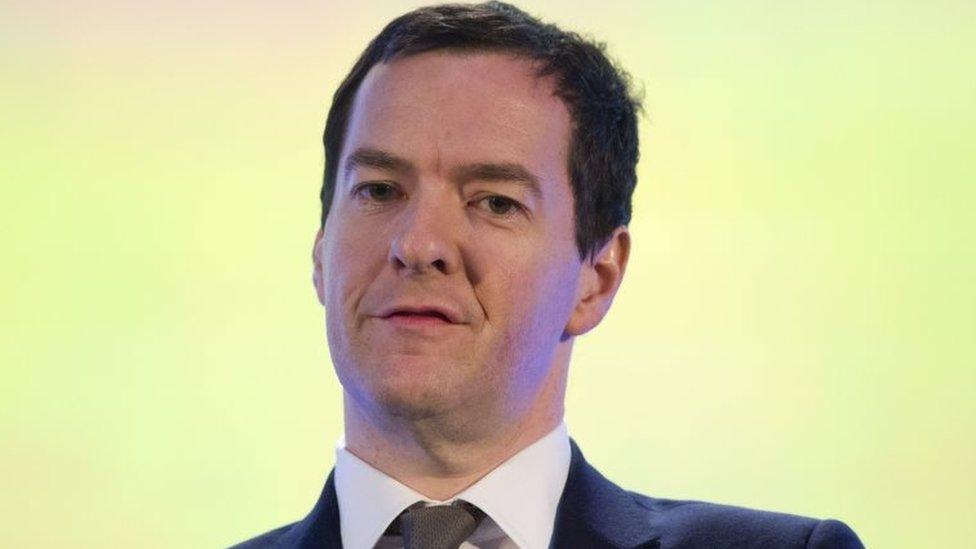Government borrowing worst October figure in six years
- Published

Public sector net borrowing (PSNB) rose £1.1bn in October compared with the same month a year ago to £8.2bn, official figures show.
That is the highest level of borrowing in October in six years.
The government has borrowed £54.3bn so far this year and is making slow progress on meeting the Office for Budget Responsibility's (OBR) forecast.
These figures mean Chancellor George Osborne will need to restrict borrowing to just £15bn between now and April.
While not impossible - January usually sees a surplus thanks to an influx of self-assessment income tax receipts - it remains unlikely that the chancellor will meet the £69.5bn OBR forecast without severe cuts at next week's Autumn Statement.
The previous annual borrowing figure was £90.1bn.
The Treasury said the figures showed the job of rebalancing the economy was "not yet done".
It added that "government borrowing remains too high".
The Institute for Fiscal Studies (IFS) said the chancellor faces "two big challenges" to meet cuts plans and achieve a surplus by 2019-20.
"The first is to divide up the shrinking budget for day-to-day spending by departments, while continuing to protect many areas of spending.
"The second is to remain within his welfare cap while taking on board the recent House of Lords motion that he must reconsider the tax credit cuts he announced in July," said IFS.

Analysis: BBC economics correspondent Andy Verity
So you thought we were living in a time of austerity. Yet the question is increasingly - austerity for whom?
The Treasury's acknowledged that government borrowing "remains too high".
Even ignoring the fact that it was the worst October for the public finances since 2009 (which could be down to statistical blips) the government had to borrow £54.3bn from April to October to plug the gap between its income and its spending.
If George Osborne is to achieve his goal of borrowing no more than £69.5bn for the whole financial year, there isn't much headroom left for the remaining five months.
It's highly likely that the Office for Budget Responsibility will have to relax its forecast at next week's Autumn Statement.
The fact that the budget deficit is falling at all is not because of reduced spending but because of increased tax receipts.
From April to October central government spending rose by 1.1% to £402.6bn.
A big part of the reason for that was that the government has exempted the health budget from austerity.
It is also raising the basic state pension by a minimum of 2.5% a year - even when inflation is negative.
Overwhelmingly, the beneficiaries of those exemptions are members of the older generation.
By contrast, those who bear the brunt of the planned tax credit and benefit cuts will be people of working age.

Borrowing warnings
Many economists say the Treasury has no hope of meeting the OBR's forecast for this year.
Howard Archer chief UK and European economist at IHS Global Insight said: "George Osborne now has an almighty task to meet his fiscal targets for 2015/16.
"Indeed, if the pattern of the first seven months of the fiscal year continued, PSNB would amount to £80.3bn in 2015/16, which would mean that Mr Osborne would overshoot by some £11bn the target of £69.5 billion contained in his July budget."
Ruth Miller, UK economist at Capital Economics, is also forecasting borrowing this year of £80.3bn and says today's figures leave the Chancellor "with less room for manoeuvre" in next week's Autumn Statement.
Government borrowing in the 12 months to October stood at £70bn taking the total national debt now to £1.5 trillion, or 80.5% of the UK's annual economic output.
John Hawksworth, PwC's chief economist, said the borrowing figures were "a little disappointing for the Chancellor".
"Our estimates based on simple extrapolation from these data suggest that public borrowing could overshoot the OBR target by around £5bn this year," he said.
But British Chambers of Commerce economist David Kern was a little more upbeat, saying: "This financial year so far the government is making progress in cutting the deficit, and there is still a realistic chance that they will achieve the target set in the July budget."
- Published24 November 2015

- Published21 October 2015

- Published13 April 2015
